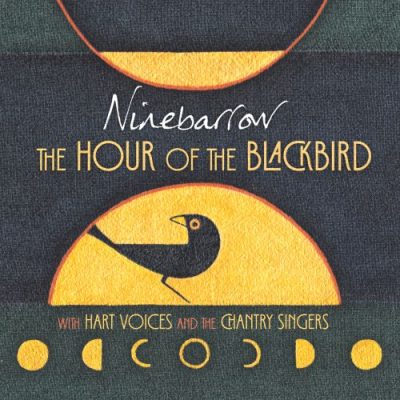
The voice is a most marvelous instrument, it has a flexibility to move the mind in ways that fuel the heart and soul, which is what makes Ninebarrow’s new album, The Hour of the Blackbird, a most mystical experience. While the combination of Jon Whitley and Jay Bouchardiere’s voices have cast a spell over their previous albums, it hardly prepares you for what occurs when they are combined with grace and power of the combined harmonies of Hart Voices and The Chantry Singers. Nothing radical occurs, but everything changes.
When a band wants to do something unique, they generally turn to the use of strings to create new shades and colors. Whitley and Bouchardiere decided to go in a totally different direction. One based on a song they re-recorded during the pandemic, ‘The Hour of the Blackbird’. Recording remotely at that time, the song ended up raising $8,000 for the MIND charity. As Bouchardiere recalls, “The response to that blew us away and we thought if one song can sound this good recorded through phones and laptops imagine what a studio collaboration could sound like.”
Under the direction of Roy Rashbrook (himself a member of the St. Paul’s Cathedral Choir), these choirs found a wellspring of magic and music to add to the already enchanting voices of the two singers, who have been described as, “two halves of one voice” by BBC 6 Music’s Mark Radcliffe. The simplicity of the musical beds these choirs sing against speaks volumes about Whitley and Bouchardiere, along with their ability to find the proper sounds to enhance the work of these forty voices.
‘Come January’ paints a melancholy portrait of winter in Dorset, subdued and calm with a lone piano offering the background leading to the angelic choir. Again and again, Ninebarrow offers restraint in their instrumental choices, allowing the assembled voices to offer the shading necessary to build the song. From the heathlands, ‘Nestledown’ offers a pastoral winter waltz inspired by the non-migratory Dartford Warbler, weathering the winter until spring returns.
Addressing the plight of refugees living in camps throughout Europe, ‘Under the Fence’ begins simply, guitar and reed organ against a solitary voice. Slowly but surely the song builds, initially hushed while the choir begins to add somber yet revelatory tones. Vocal flames come to life on ‘Summer Fires’. The song, inspired by a tradition of leaping through fires on Midsummer’s Day that are destined to provide good luck.
From a song cycle by Whitley’s father, Bob, ‘Coming Home’ addresses Magellan’s expedition to find the strait connecting the Atlantic and Pacific oceans. The song, told from the point of view of Magellan’s wife waiting at home, aches as she watches the water, an ache that becomes palpable as vocalists and choir sing the title line. Finally, there is ‘Farewell Shanty’, an acapella number providing a spirituality that ties the album together.
On The Hour of the Blackbird, Ninebarrow bring their acoustic comforts to play in ways that resemble choirs of angels.
